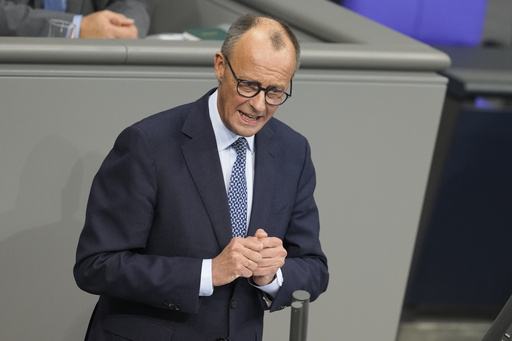
In a close vote on Wednesday, Germany’s parliament agreed to a proposal pushed by opposition leader Friedrich Merz, calling for stricter measures to turn back an increased number of migrants at the nation’s borders. This initiative, which received backing from a far-right party, has met with significant backlash as the country approaches an election next month. Chancellor Olaf Scholz’s political rival, Merz, is leading the polls and is seeking to shift the focus to migration policies following a recent tragic knife attack in Aschaffenburg, perpetrated by a rejected Afghan asylum-seeker that resulted in the deaths of a man and a two-year-old boy. Merz aims to exert pressure on the ruling parties, although he refutes charges of compromising traditional resistance to the far-right Alternative for Germany (AfD).
The nonbinding motion presented by Merz passed with 348 votes in favor and 345 against, alongside 10 abstentions. It garnered support from various opposition parties including 75 members of the AfD. Following the vote, far-right legislators expressed their approval, while Rolf Mützenich, a leader from Scholz’s party, remarked that Merz’s faction had moved away from the political center.
As Germany prepares for parliamentary elections on February 23, the current governing coalition led by Scholz has disbanded. Polls indicate Merz’s center-right Union party holds approximately 30% of voter support, with the AfD following at about 20%, and Scholz’s center-left Social Democrats trailing along with their coalition partners, the Greens. The topic of migration is emerging as a critical electoral issue, coinciding with concerns about the struggling economy. Merz appears focused on portraying the Union party as proactive in demanding a firmer stance on immigration, hoping to reduce the allure of the AfD while making Scholz and the Greens seem ineffective. However, the success of this tactic remains uncertain.
The background to these developments includes a series of violent incidents involving migrants. In addition to the Aschaffenburg attack, last year there were similar knife assaults in Mannheim and Solingen perpetrated by immigrants from Afghanistan and Syria respectively, one of whom had also been a rejected asylum-seeker. A recent attack during a Christmas market in Magdeburg involved a Saudi doctor who had come to the attention of local authorities previously. Merz criticizes Germany’s asylum and immigration policies over the past decade, tracing problems back to the decisions made by former Chancellor Angela Merkel to allow a significant influx of migrants.
The current government contends that measures have already been implemented to address migration-related challenges. Among these are temporary controls at the country’s borders and revisions to laws aimed at facilitating deportations, alongside a yet-to-be-finalized agreement regarding new EU migration regulations. According to officials, the number of asylum applications in Germany decreased by 30% in the past year, with 229,751 applications recorded. Up until November of the previous year, there were 18,384 deportations, a slight increase compared to the entire previous year.
Merz has announced his intentions to order permanent border controls upon assuming the chancellorship, asserting that all illegal entries, including those by asylum-seekers, would be rejected without exception. He has emphasized that individuals facing deportation should not be released if apprehended by law enforcement. He further proclaimed his intention to present border control proposals to parliament, regardless of the potential for AfD support, which has stirred concern among his opponents. Merz characterized the existing EU asylum policy as ineffective while claiming that his proposals align with EU regulations, citing similar practices in countries like Denmark and Sweden. “We owe it to our citizens, especially the victims of recent violence, to genuinely work on limiting illegal migration,” he stated.
The parliamentary vote serves as a political indication without enacting any changes to current German law. A proposed vote on migration rule alterations from the Union is scheduled for Friday and could potentially pass with the help of AfD votes.
Chancellor Scholz has criticized Merz’s push for border control and increased deportations, arguing that these calls contradict German and EU law and could jeopardize the integrity of the EU. He described Merz’s approach as populist, asserting that it violated agreements to avoid collaboration with the AfD, which has long sought to dismantle the political barriers meant to isolate it. Scholz expressed concern regarding trust, saying, “It matters greatly whether one collaborates with the far-right — especially in Germany.”
Merz firmly maintained his stance, denying any intentions of forming alliances with the AfD, and condemned Scholz’s comments as dubious and defamatory. AfD co-leader Alice Weidel criticized both Merz and Scholz, accusing the former of appropriating her party’s ideas; still, she supported the motion, labeling it as fundamental for democracy despite the criticisms directed at her party. Weidel celebrated the outcome as a milestone for democratic representation.

